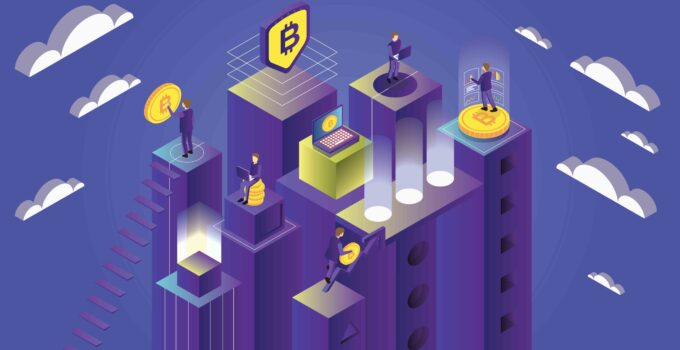DeFi platforms have created a real breakthrough in the financial sector. Decentralized finance uses cryptocurrencies and smart contracts for financial transactions. It allows you to move away from traditional centralized systems and make financial management transparent.
The topic of decentralized finance raises a lot of controversy and questions. DeFi adoption can radically change the banking system and remove the need for intermediaries. The platform opens up many new user opportunities, significantly speeding up transactions.
Page Contents
What is DeFi?
DeFi (Decentralized Finance) is a new system that eliminates the presence of an intermediary when operating. Blockchain technology avoids the intervention of an intermediary when transferring money, which violates traditional banking values.
First of all, you should understand that this is not one specific program, but a whole set of tools that work based on smart contracts. The basic principles of DeFi are:
- transparency;
- openness;
- availability.
It gives investors direct access to their savings and assets. All people who have the Internet can use the decentralized finance system. You only need an electronic wallet and a couple of minutes of time to transfer.
The system offers a sufficient number of financial instruments. With the help of DeFi protocols, you can make instant money transfers to other countries, store and buy cryptocurrency, issue loans, and trade assets. The system’s capabilities are expanding. New tools are constantly emerging that give users more options.
The Rise of DeFi

Source: fxempire.com
The rise in popularity of cryptocurrencies has sparked an increase in interest in the rise of DeFi. Users were looking for an alternative financial instrument that would allow them to conduct transactions quickly. Because for transactions, you do not need to be tied to a bank or have a card or an account, the popularity of the decentralized finance platform is gaining momentum.
In 2022, the decentralized finance market size was $13.6 billion. And there is a tendency to increase it. Experts predict a 40% increase in the market. DeFi is used in the insurance industry, game development, and eSports.
The platform’s popularity has caused some activity in the field of cryptocurrency. The developers create cryptocurrency that works in this system and brings users a stable income. The simplicity of the platform makes crypto yield farming accessible to most users. It allows you to significantly increase activity in the virtual asset market and attract new investors. Decentralized exchanges (DEXs) have become a real breakthrough in the market. The absence of intermediaries allows users to save on transaction costs and transfer money to another account in seconds.
With DeFi, users can make quick loans. For this, crypto derivatives are used to make contact in the blockchain. Thus, investors can earn on virtual assets with minimal risk. The tokens are returned to the user’s account if the transaction does not occur.
DeFi VS Traditional Finance

Source: academy.shrimpy.io
DeFi and the traditional system have a considerable number of differences. Banks and financial systems store money in a centralized system. They are the ones who will mix assets between user accounts. At the same time, users pay a certain percentage (commission) for a financial transaction. In a centralized system, there is payment for all transactions and products.
DeFi allows you to avoid third-party interference in financial transactions. It eliminates the appearance of intermediaries; the buyer and seller interact directly. The database is accessible from anywhere in the world. If you have the Internet, you can trade, buy, make a deposit, or issue credit funds. The software gives users complete control over all assets and savings.
It is worth noting that the value of assets in the traditional finance system depends on the stock price on the stock exchanges. DeFi relies on blockchain. It allows users to access Automated market makers (AMMs), staking and digital tokens.
Decentralized finance does not restrict users and the use of finance. In the central system, the bank or other entity makes the decision to lend and conduct transactions.
Problems and Risks of DeFi
The decentralized finance system is constantly evolving. It has good prospects in terms of the traditional system. But remember the DeFi risks and challenges that exist at the moment.
Even though anyone can access it, the decentralized finance system is quite complex. For beginners and those who have just started dealing with cryptocurrency, it won’t be easy to understand all the features immediately.
It is also worth noting that DeFi platforms come with fairly high-security risks. The vulnerability of intelligent contracts provokes frequent hacking of wallets. Due to the lack of regulation, users cannot recover lost assets, undermining decentralized finance’s credibility.
Don’t forget about Liquidity pools. DeFi runs on the blockchain. It is the same system that ensures the viability of the cryptocurrency. That is, market fluctuations directly affect the state of decentralized finance.
The Future of DeFi

Source: cointelegraph.com
The exclusion of intermediaries from financial transactions is a rather tempting offer. Therefore, the future of DeFi looks very promising. Thanks to the platform, investors can become more independent in managing their own assets. A decentralized system can open access to new investments that will provide high profits.
It is essential to understand that there is no precise regulation of DeFi and cryptocurrencies at this stage. Therefore, users are wary of this system. But the active growth in the platform’s popularity may lead to the development of new acts that will control decentralized finance. It will lead to successful integrations and improved performance in the banking sector. Creating rules will increase the level of user trust.
Experts believe that DeFi can significantly reduce fees. Eliminating obsolete technologies will make financial transactions more accessible and faster. With improvements in security and privacy, decentralized finance will be a great alternative.
Conclusion
DeFi has enormous potential for development. The system affects the virtual asset market and changes the general understanding of finance. The spread of the decentralized financial system creates more opportunities for crypto investors. It will lead to the expansion of the market and the creation of new products and tools.




